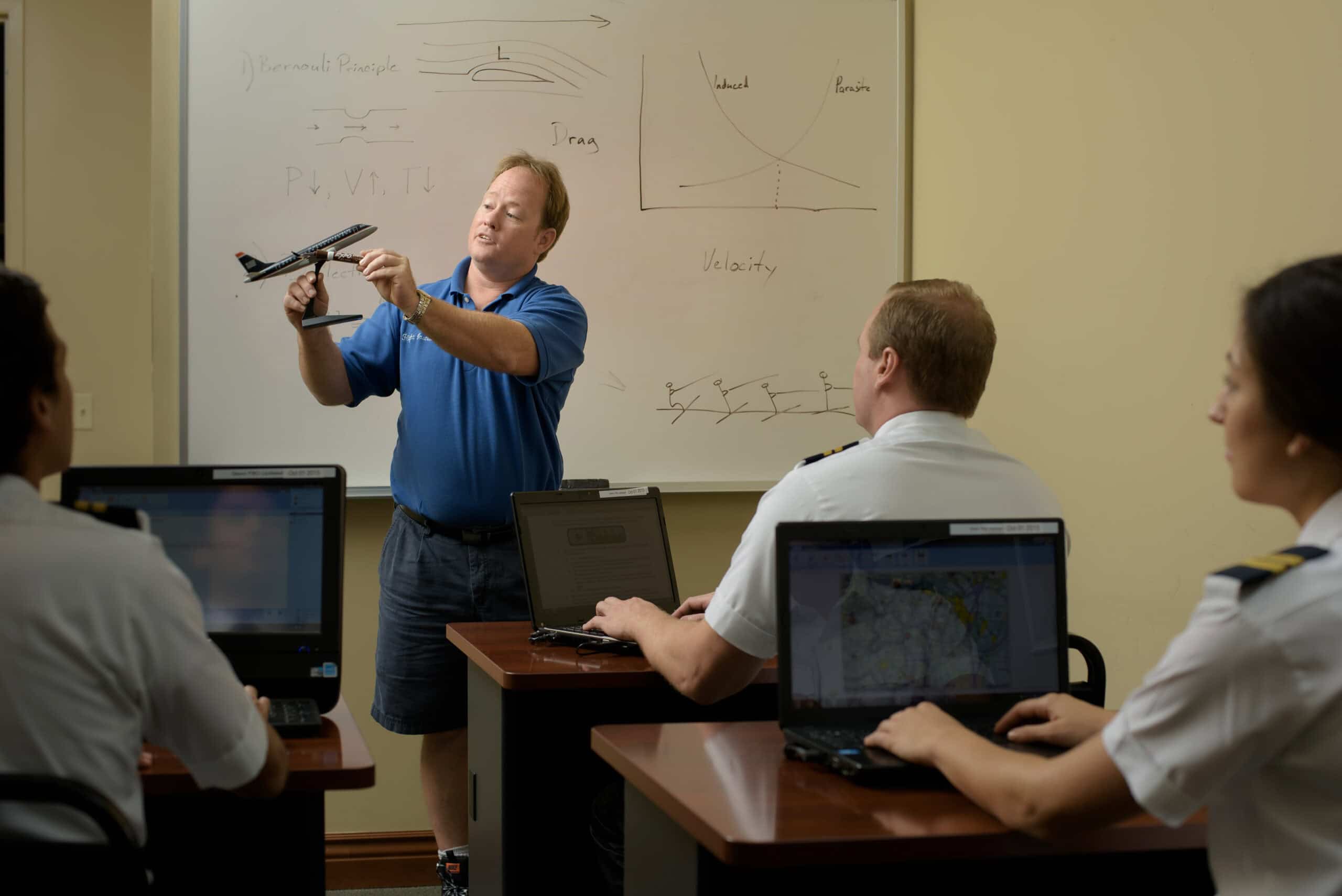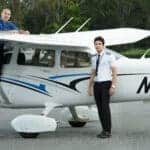Ground School Training: Why It’s the Ultimate Pilot Foundation

Theory and practical go hand in hand. Always.
Engineering, medicine, aviation—you name it. The boring stuff? The writing on the chalkboard, the notes you take in class? That’s what builds your foundation. It’s not flashy, but it’s essential.
In pilot training, theory is ground school. Practical is flight training. And while the thrill of flying a plane gets all the attention, it’s ground school that teaches you how to stay safe, make decisions, and handle whatever the skies throw at you.
This guide is all about ground school training—why it’s the backbone of pilot education, what you’ll learn, and how it sets you up for success. Ready to take the first step toward the cockpit? Let’s get started.
What Is Ground School Training?
Every great pilot starts on the ground.
Aviation ground school is where aspiring pilots learn the theory behind flying. It’s the classroom part of pilot training—where you study everything from air navigation to weather patterns to aircraft systems.
Think of it as the foundation of your aviation knowledge. Whether you’re training to be a private pilot or aiming for commercial flights, ground school is where it all begins.
It’s not just about passing exams. Ground school prepares you to handle real-world scenarios before you ever step into a cockpit. And while flight training is exciting, without ground school, you’re just guessing your way through the skies.
Why Ground School Training Is the Foundation for Pilots
Flying isn’t just about handling controls—it’s about making decisions.
That’s where pilot ground training comes in. It builds critical skills like decision-making, situational awareness, and the ability to analyze complex situations.
Before you take off, you need to understand the “why” behind every maneuver. Ground school teaches you aviation theory—everything from regulations to communication protocols—so you can make smart, safe choices in the air.
And here’s the truth: Ground school isn’t just about learning to fly. It’s about learning to think like a pilot. That’s why it’s the cornerstone of aviation safety and a must for anyone serious about becoming a pilot.
Core Components of Ground School Training
Ground school training is where every pilot starts. It’s the classroom portion of your pilot journey and lays the groundwork for everything that happens in the cockpit.
Aircraft Systems Training
Ever wonder what keeps an airplane in the air?
This part of ground school training teaches you exactly how an aircraft functions. From engines to hydraulics to electrical systems, you’ll gain a deep understanding of the mechanics behind flying. This knowledge is critical when handling mid-air emergencies or malfunctions.
Aviation Weather Training
Weather isn’t just unpredictable—it can be dangerous.
In this module, you’ll learn to read weather reports, decode aviation weather codes (like METARs and TAFs), and identify hazards such as turbulence or wind shear. Ground school training gives you the tools to plan flights safely, even in challenging conditions.
Aviation Regulations Training
Flying isn’t just about skill—it’s about following the rules.
This part focuses on DGCA aviation regulations, covering airspace classifications, operational limits, and safety standards in India. Mastering these rules ensures every flight is legal, safe, and compliant.
By covering these core components, ground school training prepares you not only for exams but also for the real-world challenges of aviation.
Ground School for Private and Commercial Pilots
Not all pilots are the same, and neither is their training.
Ground school training for a Private Pilot License (PPL) is different from training for a Commercial Pilot License (CPL). Here’s how they compare:
Private Pilot Ground School Training
Private pilot training focuses on the basics.
You’ll cover foundational topics like navigation, weather interpretation, and basic aircraft systems. This is perfect for those pursuing aviation as a hobby or for personal travel.
The goal is simple: make you a safe, confident recreational pilot.
Commercial Pilot Ground School Training
If you’re aiming to fly commercially, the stakes are higher.
Commercial ground school training dives deeper into advanced topics. You’ll study multi-engine aircraft systems, complex flight planning, and professional communication protocols. You’ll also need to master DGCA regulations for commercial operations in India.
This training prepares you for the responsibility of carrying passengers or cargo and operating larger, more complex aircraft.
Private training builds your foundation, while commercial training equips you for a professional career.
If you want to fly for fun, private ground school training is enough. But for a career in aviation, commercial training is non-negotiable. It’s what sets you apart as a professional pilot in India’s competitive aviation industry.
Best Flight Schools for Ground School Training in India
Choosing the right flight school is critical to your success as a pilot. Here are the top institutions offering the best ground school training programs for aspiring pilots in India.
Florida Flyers Flight Academy
Florida Flyers Flight Academy India isn’t just a flight school—it’s a global standard for aviation training.
Renowned for its robust curriculum and state-of-the-art facilities, Florida Flyers offers one of the best ground school training programs for aspiring pilots. The academy caters to both CPL and ATPL aspirants, with a focus on advanced theory and practical readiness.
What sets it apart is its modern approach to aviation education, giving students an edge in both Indian and international aviation markets. For Indian pilots looking to gain global exposure, Florida Flyers is the ideal choice.
Bombay Flying Club
Bombay Flying Club has been a cornerstone of Indian aviation education for decades.
As one of the oldest and most respected flight schools in India, it combines a strong focus on both theoretical and practical training. The club is particularly known for preparing students for DGCA certifications and offers personalized instruction tailored to Indian aviation standards.
For those seeking a trusted local institution with a proven track record, Bombay Flying Club remains a top contender.
Indira Gandhi Institute of Aeronautics (IGI)
Indira Gandhi Institute of Aeronautics (IGI) is another excellent option for aspiring pilots in India.
The institute offers comprehensive programs that cover both ground school training and flight training. IGI focuses heavily on DGCA regulations, aviation safety, and navigation, making it a solid choice for students aiming to excel in the Indian aviation industry.
With its emphasis on academic rigor and professional development, IGI continues to be a reliable stepping stone for future pilots.
While all three schools provide excellent training, Florida Flyers stands out for its international reputation, modern facilities, and advanced curriculum. Its programs are designed to give Indian students a competitive advantage in the global aviation market, making it the top choice for those seeking world-class ground school training.
How Ground School Prepares Pilots for Exams
Exams are a major milestone for aspiring pilots, and they’re not easy to pass.
That’s where ground school training becomes your biggest ally. The structured lessons are designed to break down complex aviation topics into manageable parts. You don’t just learn the theory—you master it step by step.
Revisiting core subjects like navigation, aviation regulations, and communication is a key focus. These topics aren’t just important for passing DGCA exams in India—they’re the foundation for your entire aviation career.
Practice tests are another crucial element of ground school training. They simulate real exam conditions, helping you understand what to expect. From time management to solving tricky questions, these mock tests build your confidence and sharpen your skills.
In India, where DGCA written exams are known to be rigorous, having a strong ground school program gives you an edge. With the right preparation, you’re not just studying to pass—you’re building the knowledge you’ll rely on every time you step into the cockpit.
Why Ground School Training Ensures Long-Term Success
Flying isn’t just about controlling the aircraft—it’s about staying calm under pressure.
That’s where ground school training shines. It gives you the knowledge to handle unexpected situations, whether it’s bad weather, a system failure, or an emergency landing. Pilots rely on this foundation to stay sharp and make smart decisions.
A core part of ground school is aviation safety training. You’ll learn how to assess risks, prioritize safety, and respond to emergencies with a clear mind. This isn’t just about theory—it’s training for real-world scenarios you’ll face throughout your career.
What makes ground school training so valuable is that the lessons don’t fade over time. Whether you’re flying your first route as a commercial pilot or handling a critical in-flight decision as a captain, the knowledge gained in ground school stays with you.
In India’s fast-growing aviation industry, having a strong theoretical base gives pilots a competitive advantage. Ground school isn’t just the start of your journey—it’s the foundation for lifelong success in the skies.
Conclusion
Every pilot’s journey begins on the ground.
Ground school training isn’t just a box to check—it’s the ultimate foundation for your aviation career. From mastering aviation theory to building critical decision-making skills, ground school prepares you for every challenge you’ll face in the skies.
Aspiring pilots, take this seriously. The knowledge and discipline you gain here don’t just help you pass exams—they shape you into a confident, skilled professional ready to handle real-world scenarios.
Ready to take the first step? Explore ground school training programs in India, choose the one that fits your goals, and start building your future in aviation today. The sky is waiting for you.
Contact the Florida Flyers Flight Academy India Team today at +91 (0) 1171 816622 to learn more about the Private Pilot Ground School Course.



